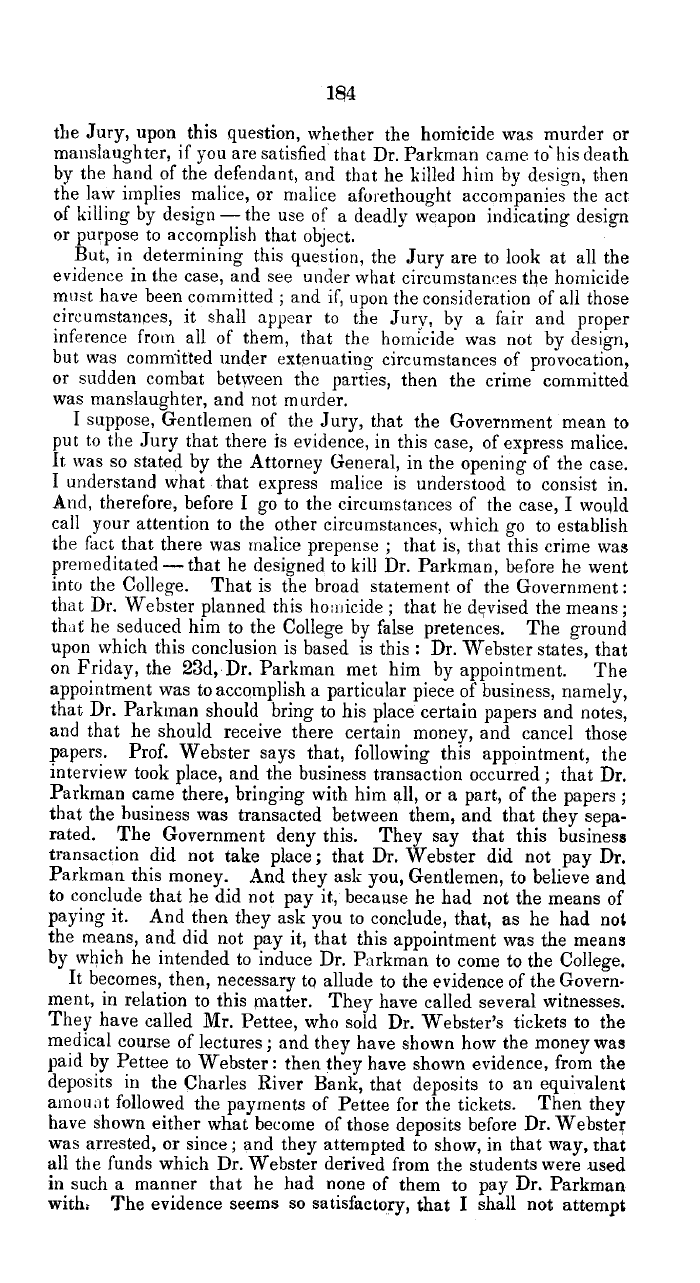|
1$4
the Jury, upon this question, whether the homicide was murder or
manslaughter, if you are satisfied that Dr. Parkman carne to his death
by the hand of the defendant, and that he killed him by design, then
the law implies malice, or malice aforethought accompanies the act
of killing by design-the use of a deadly weapon indicating design
or purpose to accomplish that object.
But, in determining this question, the Jury are to look at all the
evidence in the case, and see under what circumstances the homicide
must have been committed ; and if, upon the consideration of all those
circurnstanpes, it shall appear to the Jurv, by a fair and proper
inference from all of them, that the homicide was not by design,
but was committed under extenuating circumstances of provocation,
or sudden combat between the parties, then the crime committed
was manslaughter, and not murder.
I suppose, Gentlemen of the Jury, that the Government mean to
put to the Jury that there is evidence, in this case, of express malice.
It was so stated by the Attorney General, in the opening of the case.
I understand what that express malice is understood to consist in.
And, therefore, before I go to the circumstances of the case, I would
call your attention to the other circumstances, which go to establish
the fact that there was malice prepense ; that is, that this crime was
premeditated-that he designed to kill Dr. Parkman, before he went
into the College. That is the broad statement. of the Government
that Dr. Webster planned this ho;ijicide ; that he devised the means;
that he seduced him to the College by false pretences. The ground
upon which this conclusion is based is this : Dr. Webster states, that
on Friday, the 23d, Dr. Parkman met him by appointment. The
appointment was to accomplish a particular piece of business, namely,
that Dr. Parkman should bring to his place certain papers and notes,
and that he should receive there certain money, and cancel those
papers. Prof Webster says that, following this appointment, the
interview took place, and the business transaction occurred ; that Dr.
Parkman came there, bringing with him all, or a part, of the papers ;
that the business was transacted between them, and that they sepa-
rated. The Government deny this. They say that this business
transaction did not take place; that Dr. Webster did not pay Dr.
Parkman this money. And they ask you, Gentlemen, to believe and
to conclude that he did not pay it, because he had not the means of
paying it. And then they ask you to conclude, that, as he had not
the means, and did not pay it, that this appointment was the means
by which he intended to induce Dr. Parkman to come to the College.
It becomes, then, necessary to allude to the evidence of the Govern-
ment, in relation to this matter. They have called several witnesses.
They have called Mr. Pettee, who sold Dr. Webster's tickets to the
medical course of lectures; and they have shown how the money was
paid by Pettee to Webster: then they have shown evidence, from the
deposits in the Charles River Bank, that deposits to an equivalent
amount followed the payments of Pettee for the tickets. Then they
have shown either what become of those deposits before Dr. Webster
was arrested, or since; and they attempted to show, in that way, that
all the funds which Dr. Webster derived from the students were used
in such a manner that he had none of them to pay Dr. Parkman
with: The evidence seems so satisfactory, that I shall not attempt
|

